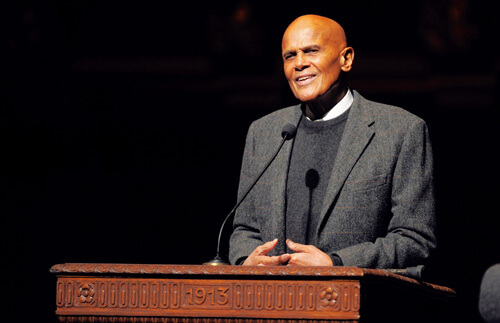Over-achieving actor, singer and civil rights activist Harry Belafonte can now add Sir to the long list of titles he has acquired throughout more than seven decades of public appearances.
The also titled “King of Calypso” and first Black Emmy award winner received the distinguished title of Knight of the Legion of Honor, France’s highest order of merit from Ambassador Philippe Etienne, the European nation’s top emissary to the United States.
In handing the honor to the 94-year-old legend, the diplomat hailed “the exceptional and unprecedented place of Harry Belafonte in public life (which) bears witness to the values dear to the United States and the French Republic.”
During the private ceremony in Manhattan, the ambassador elaborated on the exemplary qualities of the recipient saying Belafonte’s embrace of “a number of founding principles of our democratic societies: the pursuit of freedom, equality and the guarantee of human rights for all.”
Adding that “the singular impact of Mr. Belafonte on the lives of Blacks and American culture, for more than seven decades, is a source of inspiration for France and the rest of the world, for future generations”.
Rev. Al Sharpton and close family members and friends joined the honoree as he basked in the significance of the ceremonial reception.
Reportedly, Belafonte sipped champagne afterwards.
Born March 1, 1927, Harold George “Harry” Bellanfanti Jr., to a Jamaican mother and a father from Martinique, the Harlem native scaled to stardom soon after serving in the US Navy.
Following his stint in the military he enrolled in drama school. He has often reflected on times he spent there with fellow student Marlon Brando, jazz masters of the time and now legendary individuals he associated with while perfecting his art.
In 1953 he debuted on Broadway in the award-winning musical “Almanac.”
Director Otto Preminger steered his career to cinema one year later casting him with Dorothy Dandridge for the co-starring role in the film “Carmen Jones.”
From there his career exploded to include that of his Caribbean accomplice Sidney Poitier. In 1957, Belafonte recorded a first for his race and gender becoming the trailblazing Black to portray a romantic character with a white woman in the film “Island In The Sun.”
It was released 10 years before Poitier received accolades for repeating the then-forbidden act.
Belafonte scored another first when he snagged an Emmy Award for his television show “Tonight with Harry Belafonte.”
Much acclaimed for his rendition of the “Banana Boat” song, Belafonte’s “Day-O” emerged the unrivaled triumph in 1956 when he released a compilation album labelled “Calypso.”
The release exceeded expectations, making history as the first recording to surpass sales of one million copies.
Allegedly, the record-breaking feat spawned the launch of a Grammy Awards presentation platform to music makers.
Belafonte is the proud recipient of six gold records, BET Humanitarian Award, a Grammy Lifetime Achievement Award and three Grammy Awards among others.
However, an entire segment of the society often regales the many humanitarian causes Belafonte committed. His alliance with Dr. Martin Luther King Jr. is well documented. Together, they revolutionized the south marching in protest of Jim Crow laws.
The celebrity is also revered for inviting conservative Republicans and apolitical Hollywood celebrities to show solidarity with social justice causes.
Due to Belafonte’s persuasion, Sammy Davis Jr., Charlton Heston and others aligned themselves with MLK’s movement for change in America.
In the 1980s, Belafonte spearheaded a movement to expose apartheid in South Africa. Through his initiative exiled cultural activist and singer Miriam Makeba was able to travel and perform with him in concerts. He mobilized against racism by promoting the hit fundraising “We are the World” song.
New Yorkers will also recall the Yankee Stadium concert he produced to welcome Nelson Mandela to the city in 1990.
His distinctions include three decades as goodwill ambassador of United Nations International Children Educational Fund (UNICEF).
In 2015, the film academy rewarded the son of the Caribbean for his life-long achievements in the genre by presenting Belafonte with an honorary Oscar for his activism for children, human and civil rights.
























